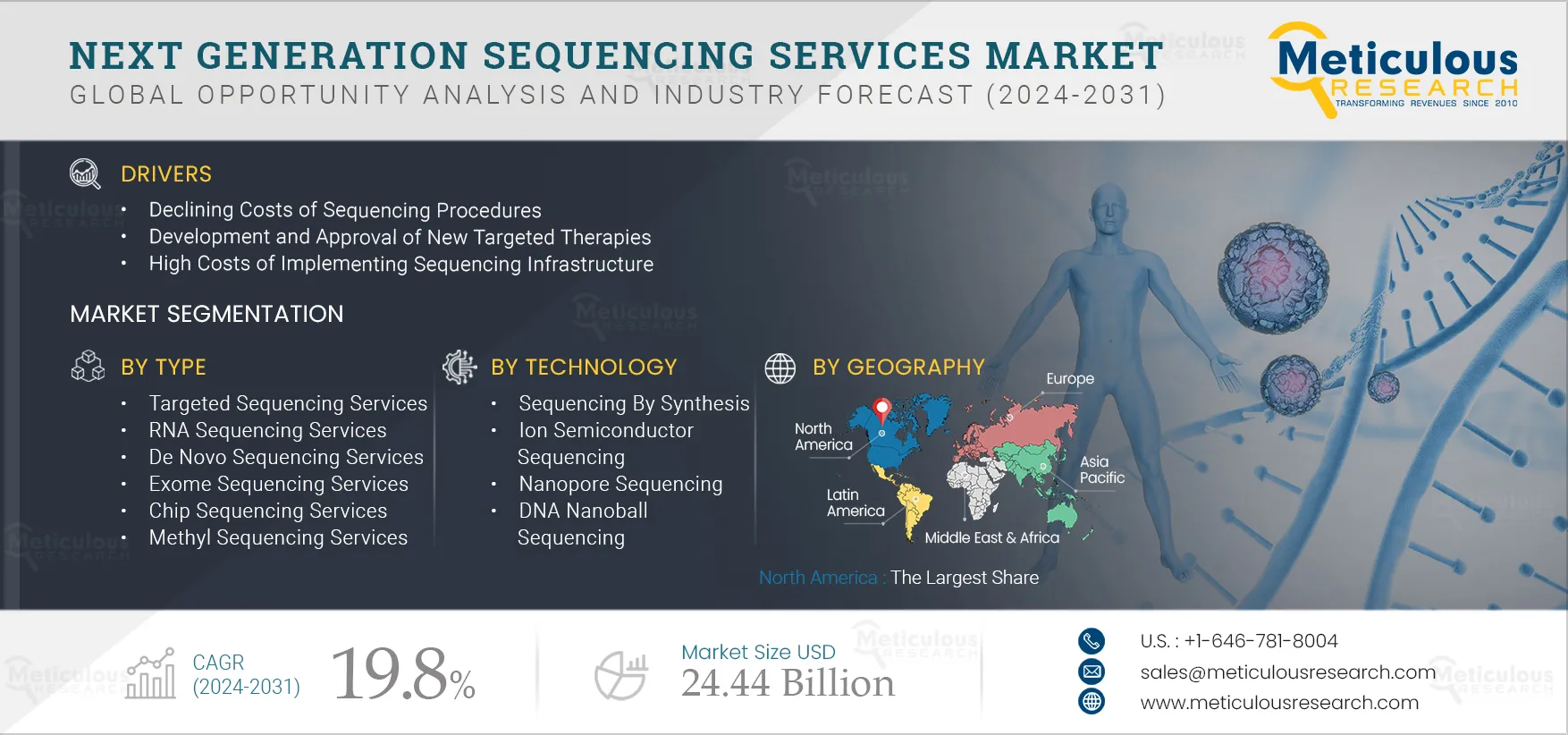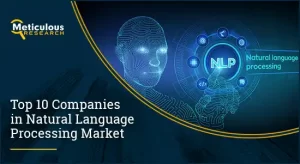The Next Generation Sequencing (NGS) Services Market is poised for significant growth over the coming years. Expected to register a compound annual growth rate (CAGR) of 19.8% from 2024 to 2031, the market is projected to reach $24.44 billion by 2031. This rapid expansion is primarily driven by advancements in genomics technology, falling sequencing costs, and growing adoption across various sectors, including healthcare, agriculture, and pharmaceuticals. With applications extending from cancer research to agri-genomics, NGS is proving transformative for precision medicine and diagnostics. However, this growth trajectory is tempered by certain challenges and competition from in-house NGS installations.
Download Sample Brochures of Next Generation Sequencing Services Market:- https://www.meticulousresearch.com/download-sample-report/cp_id=5041

Key Market Drivers
1. Decreasing Costs of Sequencing
Advances in NGS technology have led to a drastic reduction in sequencing costs, facilitating widespread adoption in clinical and research settings. According to the National Human Genome Research Institute (NHGRI), the cost of sequencing a human genome dropped from $29,092 in 2010 to $562 in 2021. This substantial cost reduction has democratized access to NGS services, allowing more healthcare providers, pharmaceutical companies, and research institutions to adopt NGS technology. The decline in cost also enhances the feasibility of genomic tests for diseases like cancer and rare genetic disorders.
2. Rising Cancer Prevalence and Need for Precision Oncology
Cancer remains a leading cause of death worldwide, with millions of cases diagnosed annually. NGS services are becoming indispensable in cancer diagnosis and treatment, particularly with the advent of precision oncology. By enabling molecular profiling of cancer cells, NGS identifies actionable biomarkers, thus aiding in the development of targeted therapies. The precision oncology approach, leveraging NGS, tailors treatments based on the unique genetic makeup of a patient’s tumor, significantly improving treatment efficacy. Furthermore, as cancer cases continue to rise globally, so does the demand for NGS-based diagnostic and therapeutic solutions.
3. Expanding Applications in Disease Diagnostics and Precision Medicine
Beyond oncology, NGS services are now utilized to diagnose an array of genetic and infectious diseases, including autism spectrum disorders, cardiomyopathies, and microbial infections. In particular, NGS plays a critical role in the detection and management of rare diseases, where traditional diagnostic methods are insufficient. Additionally, non-invasive prenatal testing (NIPT) uses NGS to detect fetal aneuploidies in high-risk pregnancies. The growing application of NGS in these fields underscores its clinical value and has spurred demand for specialized NGS services globally.
Emerging Market Trends
1. Shift Toward In-House NGS Facilities
With decreasing sequencing costs, large hospitals, academic institutions, and research centers are increasingly investing in in-house NGS capabilities. Having in-house NGS facilities allows these organizations to reduce turnaround times and improve the quality and reliability of results. This trend, while beneficial to hospitals and research institutes, poses a challenge to traditional NGS service providers, as it potentially reduces the demand for external NGS services. Consequently, NGS service providers must innovate or offer added-value services to remain competitive in this evolving landscape.
2. Increasing Use of NGS in Agri-Genomics
The agri-genomics segment is another area where NGS services are gaining traction. As global population growth drives demand for higher agricultural yields, NGS is used in plant and animal breeding to produce crops with desired traits, such as drought resistance and higher yield. Genomic technologies facilitate accelerated breeding cycles, helping address the food security challenges posed by climate change. Additionally, by enabling more efficient use of resources, NGS-supported agri-genomics contributes to sustainable agricultural practices, a priority for many nations in the face of environmental pressures.
Have Specific Research Needs? Request a Customized Research Report –https://www.meticulousresearch.com/request-customization/cp_id=5041
Challenges in the NGS Services Market
1. Regulatory and Standardization Issues in Diagnostic Testing
The lack of consistent regulatory frameworks and standardization in NGS testing represents a significant barrier for service providers. Due to the complexity of NGS technology, ensuring accuracy and reliability in diagnostic testing remains challenging. Variations in data interpretation and bioinformatics analysis can lead to inconsistent results, impacting clinical decisions. To address this, regulatory bodies across regions are working toward standardized protocols for NGS diagnostics, yet progress is slow, particularly in regions with diverse regulatory requirements.
2. Ethical Concerns Surrounding NIPT and Genetic Testing
Non-invasive prenatal testing (NIPT) is a widely adopted NGS application. However, ethical and social concerns about prenatal genetic testing remain a challenge. In some cases, the potential for genetic information misuse or discrimination is a concern. Moreover, there are significant questions about the ethical implications of genetic testing for inherited traits. Addressing these ethical issues is crucial for the widespread adoption of NGS services, particularly in healthcare.
Regional Analysis
1. North America: Leading the Global NGS Market
North America currently dominates the NGS services market, holding a 45.5% market share in 2024. The region’s growth is driven by substantial investments in genomics research, favorable reimbursement policies, and a high concentration of leading NGS service providers. Government initiatives and funding also support the expansion of NGS applications across healthcare and agriculture. For instance, the U.S. has established numerous genomics programs aimed at fostering innovation in precision medicine, further cementing North America’s position in the global market.
2. Asia-Pacific: Fastest Growing Region
The Asia-Pacific region is set to register the highest CAGR of 23.2% from 2024 to 2031. Rapid advancements in healthcare infrastructure, coupled with increasing investments in biotechnology, make Asia-Pacific a fertile ground for NGS market growth. Countries like China, Japan, and India are actively pursuing genomics research and are well-positioned in the global biotech outsourcing market. The presence of a large, skilled workforce and government support for biotechnology further contribute to the region’s NGS market growth. Additionally, rising incidences of chronic diseases and healthcare expenditures have spurred demand for NGS services across Asia-Pacific.
Immediate Delivery Available | BUY THIS RESEARCH REPORT (Insights, Charts, Tables, Figures and More) – https://www.meticulousresearch.com/request-sample-report/cp_id=5041
Key Market Segments
1. By Type
The NGS services market is segmented into various service types, with targeted sequencing services expected to hold the largest share at 43.9% in 2024. This popularity is due to targeted sequencing’s cost-effectiveness and its extensive applications in clinical diagnostics and cancer research. Whole genome sequencing, however, is projected to have the fastest CAGR of 20.3%, driven by its utility in analyzing genetic variations across populations and its expanding applications in cancer genomics and personalized medicine.
2. By Technology
Sequencing by synthesis (SBS) technology accounts for the largest market share at 62.9% in 2024, mainly due to its accuracy and scalability. SBS enables researchers to generate extensive data sets with minimal errors, enhancing the reliability of genomic insights. In contrast, nanopore sequencing technology is anticipated to exhibit the highest CAGR of 20.9% due to its rapid results and applications in infectious disease detection, cancer staging, and pathogen genotyping.
3. By Application
The research applications segment dominates the NGS services market, fueled by growing investments in drug discovery and molecular research. Precision medicine is a key driver here, as NGS enables researchers to develop targeted therapies based on genetic insights. However, clinical applications are expected to experience the highest growth rate, spurred by the adoption of NGS for oncology diagnostics and cancer gene-targeting therapies.
4. By End User
Hospitals and clinics constitute the largest segment within the NGS services market, attributed to the high demand for NGS in cancer treatment and other chronic disease management. However, the pharmaceutical and biotechnology sector is expected to show the highest growth, with companies increasingly leveraging NGS for biomarker discovery and drug development.
Competitive Landscape
The NGS services market is highly competitive, with major players including Illumina, Inc. (U.S.), QIAGEN N.V. (Netherlands), PerkinElmer, Inc. (U.S.), and Eurofins Scientific S.E. (Luxembourg), among others. These companies are investing heavily in R&D to enhance the efficiency and accuracy of NGS technologies. Strategic partnerships, acquisitions, and new product launches are some tactics employed by these firms to capture a larger market share. For instance, Illumina’s collaboration with various pharmaceutical companies to develop precision therapies underscores the industry’s emphasis on precision oncology.
Quick Buy @ https://www.meticulousresearch.com/Checkout/45664714
Next Generation Sequencing Services Market Research Summary
| Particulars | Details |
| Number of Pages | 284 |
| Format | |
| Forecast Period | 2024–2031 |
| Base Year | 2023 |
| CAGR (Value) | 19.8% |
| Market Size (Value) | USD 24.44 Billion by 2031 |
| Segments Covered | By Type
By Technology
By Application
By End User
|
| Countries Covered | North America (U.S. and Canada), Europe (Germany, France, U.K., Italy, Spain, Ireland, Netherlands, and Rest of Europe), Asia-Pacific (China, Japan, India, Australia, New Zealand, and Rest of Asia-Pacific), Latin America (Brazil, Mexico, and Rest of Latin America), and the Middle East & Africa |
| Key Companies | Animal Genetics, Inc. (U.S), Zoetis Inc. (U.S), Mars Petcare (Part of Mars, Incorporated) (U.S.), Embark Veterinary, Inc. (U.S.), Neogen Corporation (U.S.), Basepaws Inc., LABOKLIN GMBH & CO.KG (Germany), Generatio GmbH (Germany), Vetgen LLC (U.S.), FarmLab Diagnostics (Ireland) and EasyDNA (Part of Genetic Technologies Limited) (U.S.). |
Related Reports:-
About Us:
We are a trusted research partner for leading businesses worldwide, empowering Fortune 500 organizations and emerging enterprises with actionable market intelligence tailored to drive revenue transformation and strategic growth. Our insights reveal forward-looking revenue opportunities, providing our clients with a competitive edge through a diverse suite of research solutions—syndicated reports, custom research, and direct analyst engagement.
Each year, we conduct over 300 syndicated studies and manage 60+ consulting engagements across eight key industry sectors and 20+ geographic markets. With a focus on solving the complex challenges facing global business leaders, our research enables informed decision-making that propels sustainable growth and operational excellence. We are dedicated to delivering high-impact solutions that transform business performance and fuel innovation in the competitive global marketplace.
Contact Us:
Meticulous Market Research Pvt. Ltd.
1267 Willis St, Ste 200 Redding,
California, 96001, U.S.
Email– [email protected]
USA: +1-646-781-8004
Europe: +44-203-868-8738
APAC: +91 744-7780008
Visit Our Website: https://www.meticulousresearch.com/
For Latest Update Follow Us:
LinkedIn– https://www.linkedin.com/company/meticulous-research
Meticulous Blog | Top Market Research Reports Blog – https://meticulousblog.org/
Additional resources
- Jeux Casino En Ligne
- Meilleur Casino En Ligne
- Meilleur Casino En Ligne
- Meilleur Casino En Ligne
- Sites De Paris Sportifs En Belgique
- Site Paris Sportif Belgique
- Paris Sportifs Belgique
- Meilleur Casino En Ligne Belgique
- Meilleur Site Casino En Ligne Belgique
- Migliori Casino Online
- Casino Online App
- Siti Scommesse Bitcoin
- Site De Paris Sportif Bonus
- Sweet Bonanza Avis
- Ufc Paris Sportif
- オンカジ 出金 早い
- 本人確認不要 カジノ
- онлайн казино зарубежные
- Nhà Cái đến Từ Châu âu
- Site Paris Sportif Retrait Instantané
- Site De Paris Sportifs
- Nouveau Casino En Ligne Francais
- Casino En Ligne
- Nouveau Casino En Ligne Fiable
- Casino En Ligne 2026
- Casino Senza Richiesta Documenti
- Casino En Ligne Qui Paye Vraiment
- Casino En Ligne Fiable
- Casino Bitcoin
- Casino Italiani Non Aams
- Migliori Casino Online Italia
- Siti Non Aams Sicuri
- Casino Non Aams
- Meilleur Site De Casino En Ligne Belgique
- オンラインカジノ
- Meilleur Casino En Ligne France
- Casino En Ligne France
- Casino En Ligne Qui Paye Rapidement
- Casino En Ligne 2026
- Casino En Ligne






